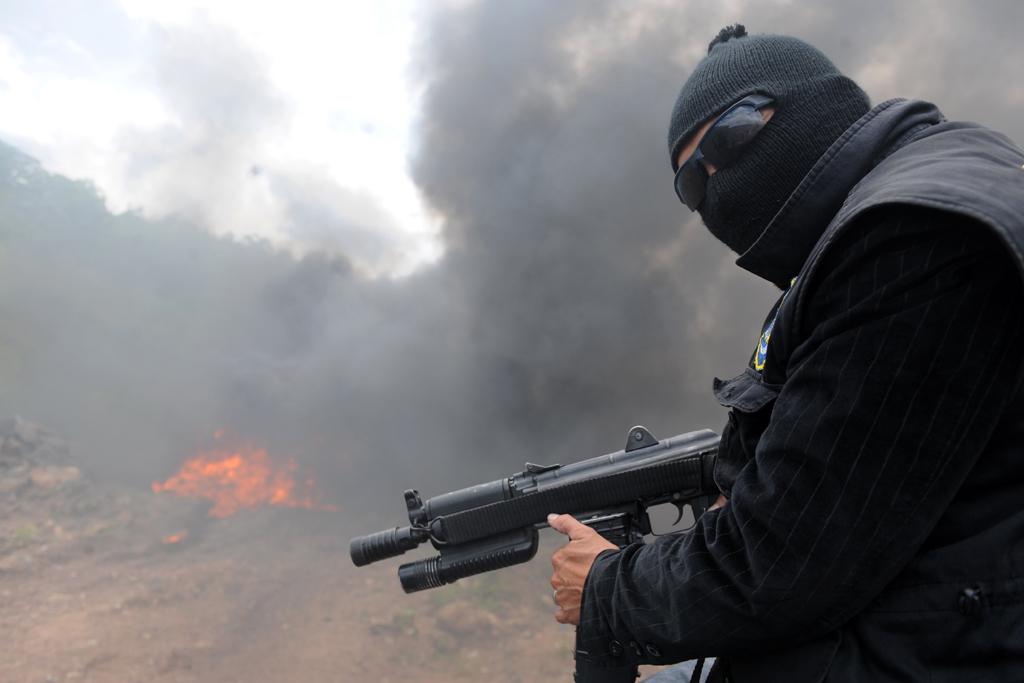Where was Latin America in the foreign policy debate?
A Honduran counternarcotics policeman stands watch during the incineration of nearly half a ton of cocaine seized in a joint operation with US DEA agents in Honduras.
As Washington gazes elsewhere, in Latin America, countries are growing a whole new class of consumers, some are re-electing anti-US strongmen and China is stealing the show. It’s a mixed scorecard. Would either candidate do anything to change America’s fading sway over its "backyard"? Maybe if they had a concrete Americas agenda. They don’t.
Latin America — motherland of the biggest US ethnic minority — has played little more than an extra in the high-drama 2012 election campaign. When it has come up, particularly in short bursts from Republicans, it's been in vague mentions of a broader quest to boost global trade or to isolate the region's America-bashing authoritarians.
That's how Latin America popped up briefly in the second and third presidential debates. Republican presidential candidate Mitt Romney fumed that President Barack Obama dared suggest he would meet with outcasts like Venezuela's Hugo Chavez or Cuba's Raul Castro — even though those leaders are still waiting for an invitation. And as part of a five-point growth plan, Romney reiterated his goal to “expand trade in Latin America.”
"As a matter of fact, Latin America’s economy is almost as big as the economy of China. We’re all focused on China. Latin America is a huge opportunity for us," Romney claimed in Monday night's debate in Boca Raton, Fla.
However, while several economies in the region are posting admirable growth, Latin America's gross domestic product lags China's by $2.5 trillion in nominal terms and as much as $4.5 trillion when adjusted for purchasing power parity, according to Slate's Moneybox blog.
Throughout the three debates, Obama paid no attention to the Americas.
Mexico is the United States’ second-largest export destination. As Obama touts efforts to double exports, it’s in Washington’s interests to have a happy neighbor south of the Rio Grande. That neighbor — Washington’s close partner in a failing drug war — has voted out the party that’s built bridges with the US for over a decade. Mexico’s new President Enrique Pena Nieto gets sworn in Dec. 1, and whoever takes the White House the following month had better start networking Mexican style.
Romney says he wants to deepen free-market ties among ally countries, to exclude China. But Latin America largely embraces China, and Romney’s chosen name for this new club — the “Reagan Economic Zone” — would likely irk many in a region who haven’t forgotten Reagan administration antics like the Iran Contra Affair that fueled bloody battles in Nicaragua.
Washington sinks billions each year into the global drug war, and Latin America has long been the battleground. In Mexico more than 50,000 people have been killed since the end of 2006. Leaders across the region are fed up with a war that isn’t working, and many are mulling bold alternatives — including legalizing and regulating parts of the drug trade. The Obama administration is against that, but has said it’s a talk worth having.
Romney would continue the long drug war. And on US demand, speaking on Spanish-language TV’s Univision, he echoed the current government’s line that Americans must “reduce drug usage.”
But he might be missing an opportunity to pounce on his opponent for the administration’s handling of this troubled war. A recent case in point: a bungled, US-backed counternarcotics effort in Honduras that reportedly lacked clear rules and might have cost innocent lives.
As battling gangs carve trails across Mexico and Central America, a foreign policy problem has spawned a domestic one: violence in Central America has led to a 50 percent rise in the number of unaccompanied migrant children seeking refuge in the United States, the Los Angeles Times reported.
On immigration, Obama scored well with coveted Latino voters when he unveiled the deferred action program for some young undocumented immigrants. The Democratic Party says it is committed to future immigration reform. Romney has vowed to build an “impermeable border fence.”
Brazil is the largest economy in the Americas after the US. Yet the US largely overlooks the B in BRICS. Romney has vaguely said he’d like more free-trade agreements in Latin America. Barring existing treaties and impossible ones, Brazil looks like an option. China, the South American country’s biggest export market, signed a Brazil trade treaty in June. But trade disputes have weighed on US-Brazil relations. And though Obama and Brazilian President Dilma Rousseff took some steps to ease them, like passing reforms that recognize each other’s countries’ specialty liquors (bourbon and cachaca), the next US president will need to do more than sip caipirinhas to make the best of Brazil ties. Brasilia's closeness with Iran has also been a sticking point.
An even closer Iran ally, Venezuela poses problems for the candidates. Venezuelans this month re-elected Hugo Chavez, who for nearly 14 years in office has rallied his neighbors in a US-bashing, aid and trade club of nations that are increasingly backing away from US-friendly regional institutions. Oddly enough, shortly before winning a new six-year term, Chavez made a public endorsement for Obama for president. Perhaps that was thanks for Obama’s remark that Chavez doesn’t pose a “serious” national security threat to the United States, which sent Republicans howling. The GOP’s 2012 platform calls Venezuela “a narco-terrorist state.”
More from GlobalPost: Cuba and the US election
We rely on support from listeners and readers like you to keep our stories free and accessible to all. Monthly gifts are particularly meaningful because they help us plan ahead and concentrate on the stories that matter. Will you consider donating $10/month, so we can continue bringing you The World? Donations made between now and Dec. 31 will be matched 1:1. Thanks for investing in our work!
